
(Matthew 16:13-23)
May these words of this Peter be like a rock,
not a stumbling block!
|
|
"Who do you say
that I am?" Jesus asked. Simon Peter answered, "You
are the Messiah, the Son of the living God." And Jesus
answered, "Blessed are you, Simon son of Jonah! ... You are
Peter (petros), and on this rock (petra)
I will build my church..." Jesus then began to speak of
the rough road ahead. And Peter took him aside and rebuked him... "Get
behind me, Satan!" Jesus replied. "You are a stumbling
block..." (Matthew 16:13-23) May these words of this Peter be like a rock, |
"And the lot fell on me"
Message preached June 1, 2003
Long Green Valley Church of the Brethren
Glen Arm, Maryland USA
based upon Acts
1:15-26
[This message is shared as if I was the Biblical character, Matthias.]
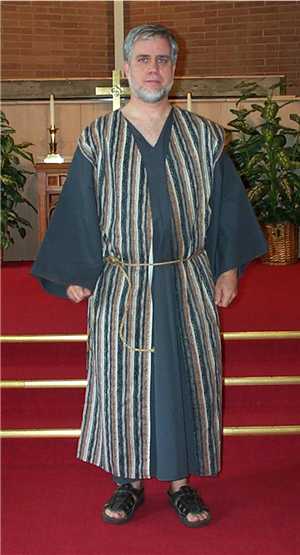 I
remember the day I first saw him. It was down by the river. Like many others, I
had come to hear what John had to say. "Repent! Turn from your wicked ways!
Be baptized!" I and my good friend, Barsabbas, were so moved that we each
entered the water and were immersed by the Baptist. Later, sitting upon the
shore, I saw him. There was something very different about this man. As he
approached, John fell on his knees at his feet. But this man lifted him up and
John baptized him instead. Perhaps it was all in my head, but it seemed in that
moment as if the boundary between heaven and earth broke open. I turned to
Barsabbas and asked, "Who is that man?" He replied, "Someone said
he is Jesus, from Nazareth."
I
remember the day I first saw him. It was down by the river. Like many others, I
had come to hear what John had to say. "Repent! Turn from your wicked ways!
Be baptized!" I and my good friend, Barsabbas, were so moved that we each
entered the water and were immersed by the Baptist. Later, sitting upon the
shore, I saw him. There was something very different about this man. As he
approached, John fell on his knees at his feet. But this man lifted him up and
John baptized him instead. Perhaps it was all in my head, but it seemed in that
moment as if the boundary between heaven and earth broke open. I turned to
Barsabbas and asked, "Who is that man?" He replied, "Someone said
he is Jesus, from Nazareth."
I remember the day I first heard him. He had called out 12 men to be his disciples, and together they journeyed from town to town, sharing what he called "good news." How clearly those first words I heard from his lips still speak to me. "Blessed are you who are poor, for yours is the kingdom of God. Blessed are you who are hungry now, for you will be filled. Blessed are you who weep now, for you will laugh. Blessed are you when people hate you, and when they exclude you, revile you, and defame you on account of the Son of Man" (Luke 6:20-22).
On that day I, along with my friend, Barsabbas, laid aside my tools and began to follow this Jesus from Nazareth. Day by day, month by month, others joined in as we traveled throughout Galilee and Judea. He spoke of Godís kingdom, telling stories which touched our imaginations, helping us to see it. My whole life I had tried to love the Lord with all my heart, soul, and mind. As he told his tales of a good Samaritan (Luke 10:29-37), or a prodigal son and a waiting father (Luke 15:11-32), or a rich man and poor Lazarus (Luke 16:19-31), he opened my mind and heart to God, that I might learn what real love is. He didnít just talk about God and his kingdom, however. He showed it, reaching out and physically touching those who needed healing. "Love your neighbor as yourself" he said (Mark 12:31, cf. Luke 10:25-28), and he did.
At one
point he sent seventy of us out, in pairs, to share what he had told us and
showed us. "Take nothing but what 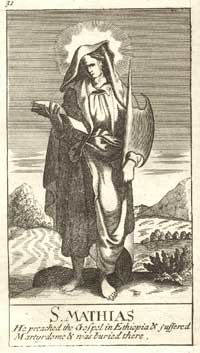 you
wear," he said. "Eat and drink in whatever home welcomes you,"
he said. "Tell them and show them that the kingdom of God has come near."
Those were his instructions. Of course, if some close their doors, he told us to
simply wipe the dust off our sandals and keep going (Luke
10:1-12). It seemed only natural that Barbassas and I be a team, good
friends that we were. So we went as we were sent. Wonderful things happened
along the way!
you
wear," he said. "Eat and drink in whatever home welcomes you,"
he said. "Tell them and show them that the kingdom of God has come near."
Those were his instructions. Of course, if some close their doors, he told us to
simply wipe the dust off our sandals and keep going (Luke
10:1-12). It seemed only natural that Barbassas and I be a team, good
friends that we were. So we went as we were sent. Wonderful things happened
along the way!
I remember it all, as if it were only yesterday. What stories I could tell, and will - if you would open your home to what I have to say and show. I recall vividly the day we came, finally, to the very gates of Jerusalem. It seemed as if the whole world had come to recognize Jesus of Nazareth. "Hosanna," "blessed is the king who comes in the name of the Lord," everyone shouted - those of us who had been following him as well as many others who were there to celebrate Passover (Luke 19:29-40). It was marvelous.
Of course, very quickly that bright day lead into a week unlike any other. Blessings turned to curses, and his followers started fall away, one by one. We had heard him speak of dark days ahead (Luke 9:18-27, 44-45; 12:49-56; 18:31-34), but his words made little sense at the time. Either that, or we just didnít want to believe them. His words, however, came true in stark reality. How well I remember the night he shared his final meal. No, I wasnít one of the twelve, but I and Barsabbas were still among his followers. We had not fallen away. "This is my body, which is for you, do eat it and remember," he told Peter and the rest as he broke bread. "This cup is poured out for you - a new covenant in my blood," he said to them (Luke 22:14-23). I heard and saw it all from the doorway where Barsabbas and I stood.
I remember
the rest of that night, how evil came under cover of darkness and took him away,
betrayed by one of his own. When the twelve ran away in fear, so did I and my
friend, Barsabbas. We heard of how he was shuffled from one place 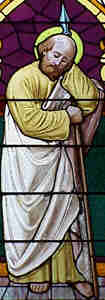 to
the next, from the home of Caiphas (Luke
22:54, 63-65), to the Sanhedrin (Luke
22:66-71), to Pilate (Luke
23:1-6), to Herod (Luke
23:7-12), and back again to Pilate (Luke
23:13-17). It was there that blessings changed to curses as the
crowds shouted "crucify him" (Luke
23:18-25). This they did (Luke
23:26-48). Like the rest of his followers, though, I only know it
from a distance, for we had all fallen away (Luke
23:49).
to
the next, from the home of Caiphas (Luke
22:54, 63-65), to the Sanhedrin (Luke
22:66-71), to Pilate (Luke
23:1-6), to Herod (Luke
23:7-12), and back again to Pilate (Luke
23:13-17). It was there that blessings changed to curses as the
crowds shouted "crucify him" (Luke
23:18-25). This they did (Luke
23:26-48). Like the rest of his followers, though, I only know it
from a distance, for we had all fallen away (Luke
23:49).
You know, donít you, that this was not the end of Jesus of Nazareth, nor of his followers? On the third day he rose from death. The women among us were the first to see his empty tomb (Luke 24:1-12). But what did it mean? We were still in the dark. Two other disciples, Cleopas and his friend came to us with a strange tale of walking with Jesus on the road to Emmaus (Luke 24:13-35). We didnít know what to think. And then he came to us all (Luke 24:36-49). And I, along with my friend Barsabbas, and the eleven - as well as all the rest, saw him. He was alive! My Lord and my God - he is alive! I am a witness.
After he ascended to the Father (Luke 24:50-53, Acts 1:6-11), we faced a dilemma. There were enough of us to constitute a synagogue, a congregation, but our leadership was not complete. Jesus had called out twelve apostles, whom we now looked to as we wondered, "what next?" Now, though, there were only eleven. Judas Iscariot, who had betrayed our Lord, was dead. Peter, who had himself denied Jesus (not once, but three times - Luke 22:54-62), recalled what Judas did, and encouraged us to call out someone else to take his place.
How should you do something like that? It was Jesus who called the twelve together. It was like the hand of God was upon each one of them, sent out by God as his special messengers to tell the story and show the Way. Thatís what the word "apostle" means, you know. "One who is sent." How could we call out someone to be Godís apostle? Do you vote on something like that? If we did, it would like our decision, not Godís. Do you understand the dilemma we faced? The day when the Holy Spirit blew open our lives had not yet arrived.
We prayed
and talked about it, and figure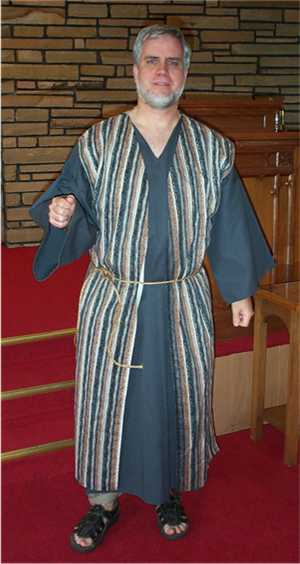 d
that whoever it was that would take the place of Judas Iscariot should be
someone who had been there from the days of Johnís baptism through to the
present moment - seeing it all, hearing it all. Most important, this person
needed to be an eyewitness of the resurrection - that is, someone who had seen
the risen Lord.
d
that whoever it was that would take the place of Judas Iscariot should be
someone who had been there from the days of Johnís baptism through to the
present moment - seeing it all, hearing it all. Most important, this person
needed to be an eyewitness of the resurrection - that is, someone who had seen
the risen Lord.
I started thinking of all the persons who fit that category, and was about to offer up the name of Cleopas, when someone spoke my name. Imagine that. Me, of all people. I almost laughed out loud at the thought. Funny thing is, they also mentioned my friend Barsabbas. True, we both were there through it all but, come on, this is Barsabbas and me - two nobodies from the boondocks.
Now, I must confess that on the one hand I was jumping up and down on the inside. Havenít you ever wanted to do something really, really big? Havenít you ever desired to be recognized as really, really important? Come on! You canít be that humble. I admit it, part of me was really excited at that moment. Of course, the other part of me was scared to death. This "apostle" thing was so much bigger than me. What did I have to offer? Nothing. Okay, so me and Barsabbas had been sent out as a pair of messengers - by Jesus - to show and tell that Godís kingdom had come near, to share the good news wherever we went. But did that qualify me to be an "apostle," one of the big twelve?
Barsabbas, he would make a better apostle than me. I was sure of that. Secretly I was praying that he would get chosen and not me. You see, they didnít bring up any more names. If I couldíve, I wouldíve mentioned Cleopas. But it was like my lips were sealed.
So, there
we all were with two names from which to choose one. What now? Should we vote?
Nah! That would seem to be like it was our decision and not Godís.
Someone said, "letís cast lots." And the rest of us thought,
"duh! why didnít I think of that?" Then Andrew reminded us that we
should pray first, and so we did. "Lord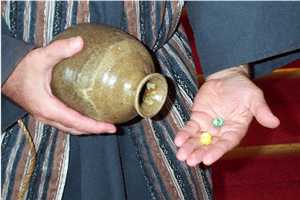 ,
you know everyoneís heart. Show us which of these two you have chosen?"
,
you know everyoneís heart. Show us which of these two you have chosen?"
James then grabbed a jar and placed in it two stones, one to represent Barsabbas and one to represent me. He shook that jar long and hard - and, I tell you now, I heard every single sound those stones made as they jangled around in that earthen vessel. It seemed like an eternity, and then one stone fell out upon the ground. Believe it or not, it was my stone. And thatís how I became one of the twelve apostles. By the way, Barsabbas and I remained good friends, even though I was chosen and not him. (see other scripture verses concerning casting lots, as well these pages on the topic: a , b , and c .)
Now, you
may be saying to yourself, "what does all this have to do with me?"
Well, the days of the Acts of us "original" Apostles may
be ancient history. We were called by God to be Jesusí twelve eyewitness
messengers sent to the twelve tribes of Israel two thousand years ago. Does that
mean that God has stopped "sending" people to be messengers of Jesus
Christ? Not at all. You may not be called an "apostle," but if it is
your lot to be sent, you will go, whether your name is Matthias or
(name some persons in congregation) .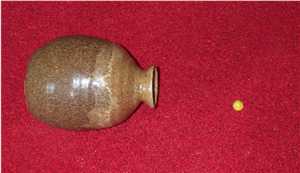
Of course, you werenít there - like I was - as an eyewitness to all that happened long ago, from the baptism of John to when Jesus was taken up. But you have received the story. I know, because I have just passed it on to you. Furthermore, if you have come to know Jesus, you have seen him at work in your own life, telling you and showing you how near Godís kingdom really is. Will you become an "apostle," a messenger of Christ "sent" by God to show and tell the good news? God knows your heart. May it be so. Amen.
[Matthias will return in four weeks to relate another story]
Note: Obviously, I have filled in some blanks that the biblical accounts, as we have received them, leave empty. For instance, there is nothing to say Matthias and (Joseph) Barsabbas were old friends. Of course, there's nothing saying they weren't either. Who knows what Matthias was thinking or feeling throughout all this. That, however, is the wonder of scripture. We can place ourselves into the sandals of a character. Hopefully in the above account some of the important aspects of the message and calling of that original sandal-wearer are revealed.
| online resources for this scripture text |
For commentaries consulted, see Acts. |
©2003 Peter
L. Haynes
(you are welcome to borrow and, where / as appropriate, note
the source - myself or those from whom I have knowingly borrowed.)